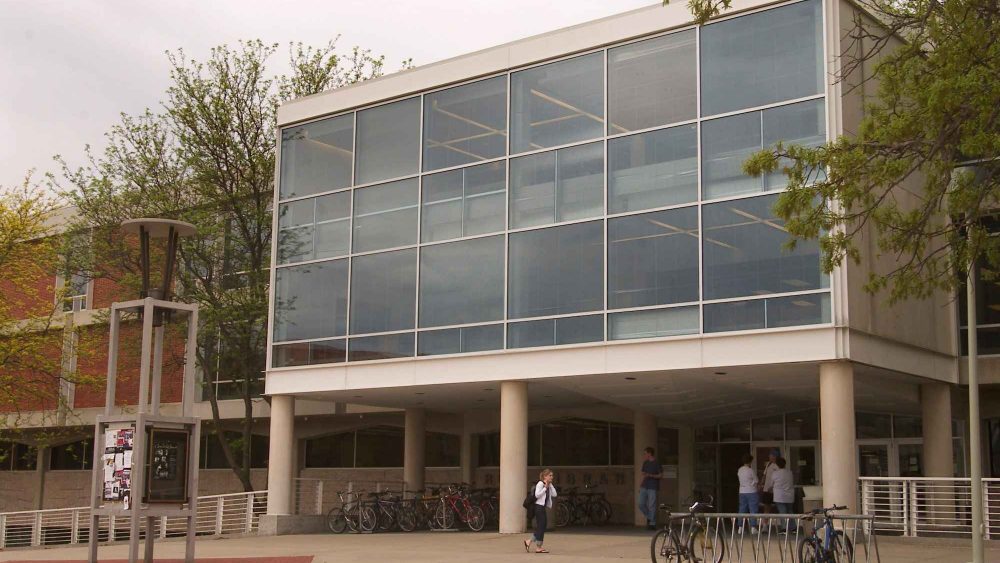An Interview with Librarian Anne Marie Gruber
FYE correspondent Raymond Pun interviews academic librarians who are integrating HIPs (high-impact practices) into their work. The Association of American Colleges and Universities (AAC&U) has defined HIPs as active learning approaches that can increase student engagement and retention. Service-learning is considered a HIP, and in this interview, Ray speaks with Anne Marie Gruber, Instruction and Liaison Librarian at the Rod Library in the University of Northern Iowa, to learn more about HIP in action.
Ray: Thanks for speaking with us! Can you describe your thoughts and experiences in supporting service-learning programs and briefly explain what they are?
Anne Marie: “There aren’t homeless people around here.” “The teen pregnancy rate has gone way up in this county.” “Waterloo has much higher poverty rates than Cedar Falls.” These are real comments I’ve heard from students preparing to partner with community agencies as part of coursework. All are simply untrue.
Among the most important role academic librarians can play in service-learning is helping prepare students with accurate evidence so they can partner effectively without misconceptions and with nuanced understandings of community needs. Librarians can also help students and faculty alike research communities through an assets-based (rather than deficits-based) approach.
As college campuses increasingly focus on the public purposes of higher education, many are emphasizing community engagement, defined by the Swearer Center as “collaboration between institutions of higher education and their larger communities […] for the mutually beneficial exchange of knowledge and resources in a context of partnership and reciprocity.”1 Community engagement can take many forms, including community-based research, internships, philanthropy, and more. Supporting such efforts can help academic libraries assert their value and ensure they are part of the conversation about institutional priorities.
Service-learning, one pedagogical approach to engaging with community, is a “course-based, credit-bearing educational experience in which students participate in an organized service activity that meets identified community needs and reflect on the service activity in such a way as to gain further understanding of course content, a broader appreciation of the discipline, and an enhanced sense of civic responsibility.”2
Ray: As a high-impact practice, how can service-learning programs enhance first-year experiences for first-year students?
Anne Marie: Service-learning is particularly advantageous for students who are academically at risk;3 Yeh found that SL opportunities, both co-curricular and course-integrated, enhanced low-income, first-generation college students’ “knowledge and learning in the classroom, enabled them to further develop academic skills, and linked them to new educational opportunities.”4 Forthcoming research5 indicates that faculty members tend to emphasize “real-world” (nonscholarly) information for service-learning projects, which can be more accessible for at-risk students and provide avenues for success. At the same time, incorporating secondary research into service-learning projects can increase their academic rigor.
In my experience partnering with faculty teaching service-learning courses, I have found positive outcomes include students’ exposure to diversity and opportunity to use professional skills, and one first-year seminar course I supported researched food insecurity and ran an advocacy campaign to raise awareness of a local food bank’s need for volunteers. Another section of the same course partnered with the Salvation Army and helped staff there get a sense for newer methods of engaging young adult volunteers and donors. All the information to guide students’ projects came from research they did with librarian and faculty guidance.
Ray: Why do you think service-learning programs are important for academic librarians and libraries to consider in their work practices, and how can librarians get started on this collaboration?
Anne Marie: Community-based projects can increase student success and retention. These approaches also logically connect with many other high-impact practices, such as first-year experiences, collaborative projects, diversity, and working closely with a faculty member.
How do academic libraries support service-learning on their campuses? Relevant library services include information literacy instruction, providing physical and online spaces to implement and showcase community projects, and ensuring public access to community-based research.
One common concern is if supporting service-learning requires more library faculty/staff. At my own library, we have not added faculty or staff to support these efforts. A train-the-trainer model has been effective in preparing liaison librarians to incorporate service-learning library instruction within a variety of disciplines. Our spaces are already available for community-based projects. We are using the existing institutional repository and related workflows to capture and highlight community engagement projects.6 Much of our move toward a programmatic approach requires simply publicizing the services we already offer and providing ideas for how these services connect with community engagement.
For academic librarians considering how to support service-learning, Katherine Kott’s Self-assessment rubric for development of service learning programs in academic libraries7 can serve as a very useful framework for assessing current practices and planning a more systemic approach. Partnering with community engagement offices can be an effective way to learn about the context on campus and potential intersections with library services. Other key resources include the Colloquium on Libraries and Service Learning and the new engaged library list-serv.8 The growing community of engaged librarians and I are looking forward to continuing the conversation!
 Anne Marie Gruber is Instruction & Liaison Librarian at University of Northern Iowa. She researches the library’s role in academic service-learning, particularly working to understand faculty perceptions of this role as well as related impacts on student success. Active with public health advocacy, she is the married mother of a kindergartener and a newborn.
Anne Marie Gruber is Instruction & Liaison Librarian at University of Northern Iowa. She researches the library’s role in academic service-learning, particularly working to understand faculty perceptions of this role as well as related impacts on student success. Active with public health advocacy, she is the married mother of a kindergartener and a newborn.
References:
- Swearer Center, Brown University. Defining community engagement. Retrieved from: https://www.brown.edu/swearer/carnegie/about
- Bringle, R. G. & Hatcher, J. A. (1996). Implementing service learning in higher education. The Journal of Higher Education, 67(2), 221-239.
- Association of American Colleges and Universities. High-impact educational practices: A brief overview. Retrieved from: https://www.aacu.org/leap/hips;
National Survey of Student Engagement. High-impact practices. Retrieved from: https://nsse.indiana.edu/nsse/survey-instruments/high-impact-practices.html - Yeh, T. L. (2010). Service-learning and persistence of low-income, first-generation college students: An exploratory study. Michigan Journal of Community Service Learning, 16, 55.
- Gruber, A.M. (forthcoming October 2018). Real-world research: A qualitative study of faculty perceptions of the library’s role in service-learning [working title]. portal: Libraries and the Academy, 18(4).
- Rod Library, University of Northern Iowa. Community Engagement Collections. Retrieved from: https://scholarworks.uni.edu/engagement/
- Kott, K. (2017). Self-assessment rubric for development of service learning programs in academic libraries. Katherine Kott Consulting. Retrieved from http://katherinekott.com/wp-content/uploads/2017/01/Service-Learning-Rubric-01.24.pdf
- The Colloquium on Libraries & Service Learning. Retrieved from: http://libraryservicelearning.com



